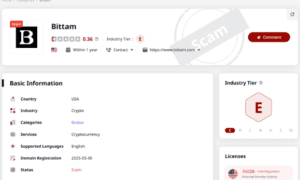No doubt about it, the best way to build your nest egg long term is through equity-based investments. Although riskier in the short term, a well-balanced portfolio of individual stocks is simply the easiest way to grow your money.
With the rise in investment apps and online platforms, it’s easier than ever to take advantage of the consistently high historical returns the U.S. stock market has to offer. But there are a lot of apps to choose from, and the list seems to growing every day.
Two of the best platforms for online investment are Betterment and TD Ameritrade. Each one has a its own niche. In the battle of Betterment vs TD Ameritrade, my analysis is that Betterment is a better platform for most people.
Betterment vs TD Ameritrade: What They Do
Betterment and TD Ameritrade are so different that deciding between the two is like comparing apples and oranges. What it ultimately comes down to is whether you want to grow your money by selecting a few preferences and inputs for an automatic investment experience or if you want to more actively trade.
Most of us will make more money doing the former. And isn’t making money what investment is all about?
Betterment
Betterment is among the newish class of robo-advisors. Robo-advisors are investment platforms that automatically create and balance a portfolio of assets appropriate to your individual risk level. The decisions on how to invest are made by computer algorithms based on input and preferences from the customer. Since the decisions are made by computers, platforms like Betterment have far lower management fees than full-service brokers like TD Ameritrade.
Since is portfolio-based, you can’t use Betterment to invest in a particular asset like an individual stock. This is more of an advantage, however, than a disadvantage. Due to Betterment’s computer-optimized diversification, your overall investment will be exposed to less risk and volatility, while you earn great returns.
Prioper diversification is the most important factor of long term, successful investing. With a properly balanced portfolio, it is possible to diversify away the idiosyncratic risk faced by a particular company or sector. If one stock sinks, your overall portfolio will remain buoyant. Betterment’s superiority at creating and optimizing individual portfolios makes it the perfect instrument to diversify your asset pool.
TD Ameritrade
TD Ameritrade, on the other hand, is a full-service brokerage platform. You can use their proprietary thinkorswim service for real-time analysis on hundreds of stocks and options. TD Ameritrade also allows for the trading of individual assets, so it is more appropriate for active traders, including people who day-trade.
TD Ameritrade does offer a managed portfolio option, but it is prohibitively expensive for many investors. TD Ameritrade has a host of usable tools, but because of the breadth of its offerings as a full-service firm, it can be a bit overwhelming for many investors to figure out which ones are right for them.
Betterment vs TD Ameritrade: Costs
Betterment significantly out-performs TD Ameritrade when it comes to cost. Betterment’s fees, at 0.25% are as low as they come. Additionally, the first year is free. Plus, Betterment doesn’t charge trading fees or commissions. Betterment has no account minimums. This makes it easy and accessible for any investor to begin growing their wealth.
For its human-managed portfolio, TD Ameritrade requires a minimum initial deposit of $25,000 plus advisory fees that vary by portfolio and management fees that start at 0.30%. This makes it a higher bar to entry than Betterment for most of us. For stock accounts, TD Ameritrade doesn’t charge commission fees for online transactions, but broker-assisted trades cost $25 each.
Betterment vs TD Ameritrade: Account Types
Though you can’t choose the content of your portfolio with Betterment, you can choose from various account types, including Traditional IRAs, Roth IRAs, SEP IRAs, inherited IRAs, individual taxable accounts, joint taxable accounts, trust accounts, high-yield cash accounts, and even checking accounts.
With TD Ameritrade, you can open all those accounts plus a few extra, including education accounts and margin trading accounts. TD Ameritrade comes out on top in terms of variety of accounts, but Betterment remains superior when it comes to the costs of managing those accounts.
Betterment vs TD Ameritrade: Security
Many people have an aversion to investing in an app-based platform, but with $10 billion in assets under management and as a member of the Securities Investor Protection Corporation (SPIC), Betterment is as safe and well-regulated as any full-service brokerage firm. Betterment also has multiple security features to help keep your account from being hacked.
As a full-service brokerage firm that has been around since 1975, you can similarly trust TD Ameritrade with your money. Its systems are also well-protected from cyber intrusions, and it is a member of the SPIC.
While you can trust the integrity and security of both platforms, all investment activities contain an element of risk. Money lost legally through financial and investment activities is not guaranteed by the SPIC.
My Preference: Betterment Wins Over TD Ameritrade
With its user-friendly interface, automatic portfolio rebalancing, tax harvesting advantages, and low management fees, I strongly prefer Betterment over TD Ameritrade for most investors. Betterment has a wealth of resources to help every type of investor up their game, from inexperienced to experienced. Its computer-enabled investment algorithms are among the best in the robo-advisor community.
TD Ameritrade has its advantages too. As a full-service firm, it enables many more transaction types if you have the money and don’t mind paying the higher fees. For most people, however, Betterment wins out, and is the more appropriate platform for simple, low-cost, long-term investment.



































